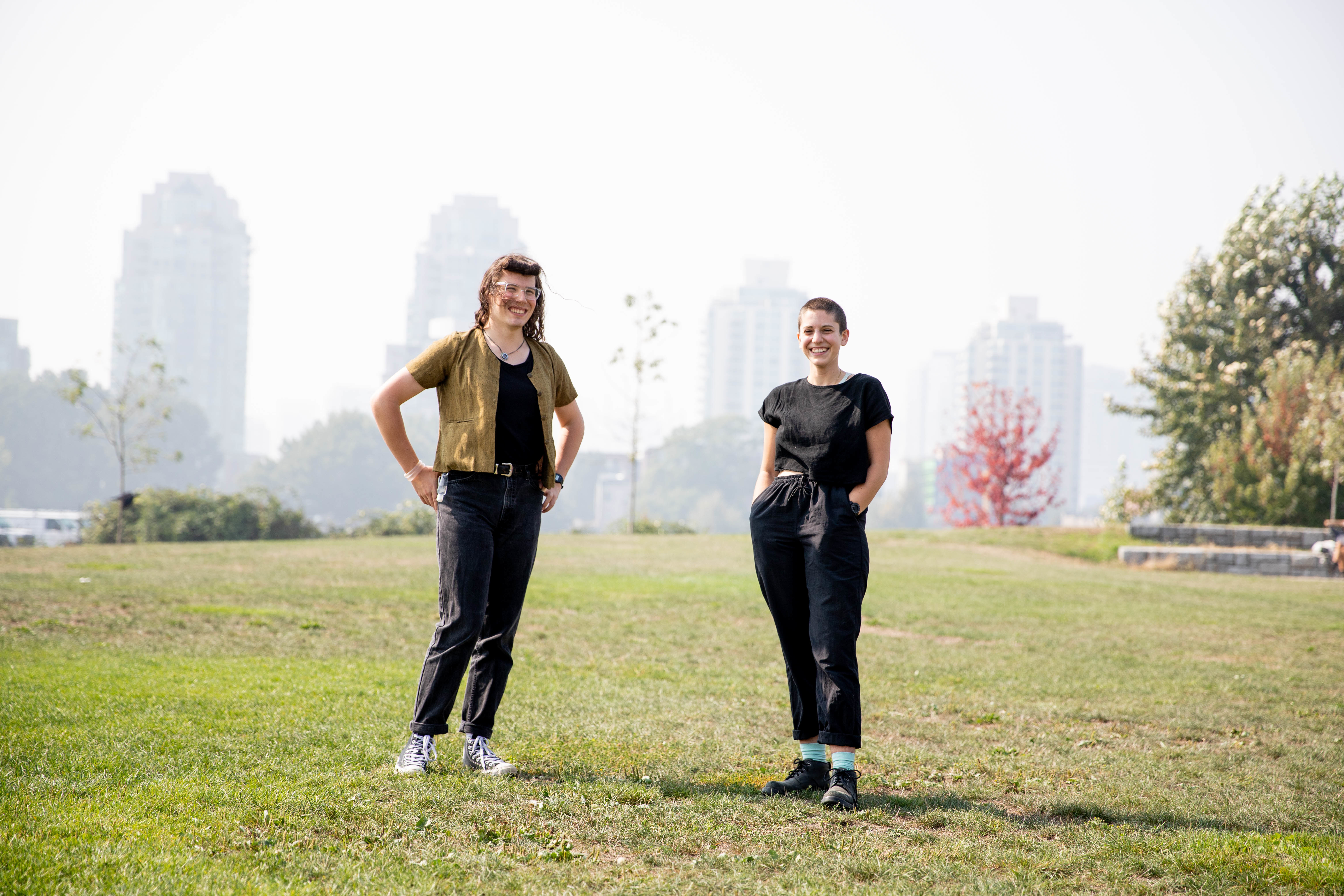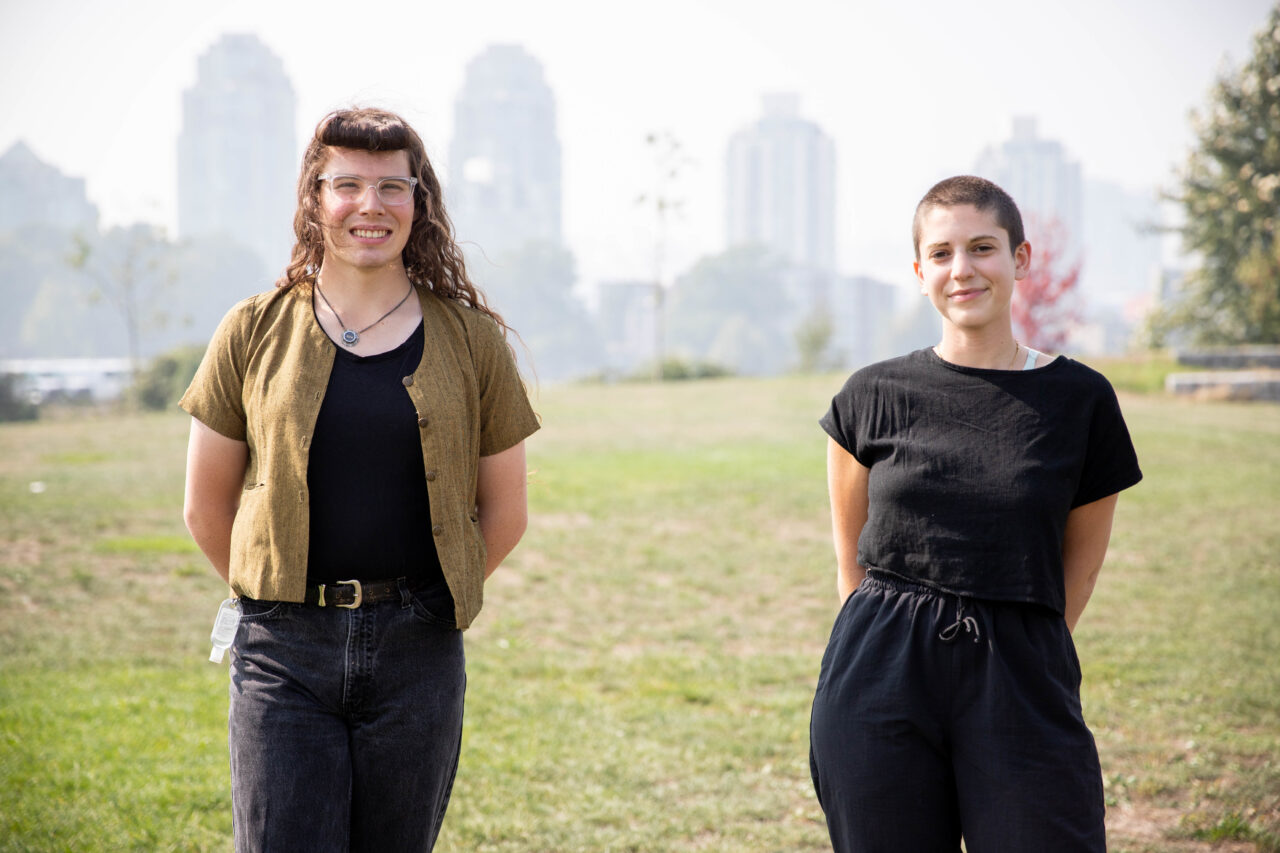‘Pocket Change’ Celebrates the Worldmaking Power of the Pocket

Posted on | Updated
Designers and ECU students Morgan Martino and Naomi Boyd take aim at systemic inequity with a focus on how textiles can be a site for reclaiming agency.
The story of the humble pocket — that secretive, private space in your clothing which acts as workhorse, piggybank or even sanctuary — is the centuries-old story of material and cultural economies, says Morgan Martino, a fourth year Industrial Design at Emily Carr and research assistant for the Health Design Lab and Graphic Research Unit.
That story, she adds, doesn’t just exist at the intersection of socioeconomics and design — it’s personal.
“It seems as though everyone has at least one story about pockets, whether it’s about losing keys or finding an old grocery list, sharing space for rocks and candy or just a space to hide fidgeting hands,” Morgan says.
“Pockets become a vessel for these memories, capturing their emotions and senses. They can lead to blissful nostalgia or to righteous anger. These stories and memories act as a gateway to discourses around larger systemic forces (consumerism, class, gender, identity), and allow people to see how they relate to them and think about what they would like to change about them in tangible ways. By asking people to think about what an ideal pocket for them would look and feel like, it gets them to think about the world they want that pocket to live in.”
Morgan forms one half of a project team called Pocket Change, alongside fellow fourth-year Industrial Design student and Writers’ Exchange literacy mentor Naomi Boyd. As part of the Shumka Centre for Creative Entrepreneurship’s 2020 Satellite program (Satellite x DESIS), the pair have been working under the mentorship of design activist and fashion and sustainability pioneer Kate Fletcher, a Research Professor of Sustainability, Design, Fashion at the Centre for Sustainable Fashion, University of the Arts London, and co-founder of the Union of Concerned Researchers in Fashion.
“Being able to make and mend your own [clothing] items using materials you already own or that are easily accessible gives you power.”
Pocket Change is “an opportunity to engage others in dialogues related to experience of gender, class, place and the environment through accessible and shareable design activities centering around pocket equity,” according to the Shumka Centre. It organizes activities that “explore the repair/reuse/redesign of pre-existing artifacts and materials as a sustainable practice, rather than relying on the consumption of new products. They will be celebrations of identity sharing, storytelling and worldmaking through textiles.”
Thus far, the Pocket Change team has been conducting material exploration as well as research into “the histories of pockets and the futures of sustainable fashion.” Workshops are also a part of the Pocket Change project, though with the pandemic still affecting daily life across the globe, the team has been operating online and encouraging participants to exchange materials by mail.
“It’s given us a different time scale and allowed us to continue collaborative making practices that wouldn’t otherwise be possible,” Morgan says.
A current workshop involves a dozen participants designing, making and sending pockets to one another based on their partner’s style and the specific ways in which they use pockets. This practice locates a person concretely in systems of material and economic exchange that are often invisible to the consumer, Morgan says. It also transfers processes of decision-making around clothing design from distant manufacturers directly into the hands of the wearer.

“Being able to make and mend your own items using materials you already own or that are easily accessible gives you power, and you become less reliant on giant corporations to sustain yourself,” she says. “You find out for yourself how easy (or how hard!) many of these objects are to design and make, and it gives you a deeper appreciation and understanding for the people who are making the mass produced versions.”
Pockets, as a concept, are also a powerful symbol through which to explore systems of oppression and inequity, she adds. The act of making pockets and modifying clothing to contain them is therefore an act of laying bare those systemic forces, and of reclaiming the agency they would undermine.
“Through our conversations, research and workshops, we’ve been able to see how giving people the space and tools necessary to design their own clothing has allowed them to feel more confident in their own agency when confronted with these complex and messy systems.”
Pocket Change recently launched its website, where you’ll soon be able to find out more about upcoming events, as well as read writing by Morgan and Naomi. The 2020 Shumka Centre Satellite program — Satellite x DESIS — runs through October, 2020.
The Satellite x DESIS: Summer Residency Presentations will take place online on Tuesday, Oct. 6, and are open to the public. You can learn more about how to tune in on the Shumka Centre's brand new website!